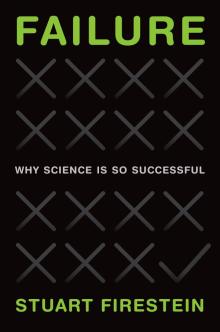
Failure: Why Science Is So Successful
The general public has a glorified view of the pursuit of scientific research. However, the idealized perception of science as a rule-based, methodical system for accumulating facts could not be further from the truth. Modern science involves the idiosyncratic, often bumbling search for understanding in uncharted territories, full of wrong turns, false findings, and the occasional remarkable success.
In his sequel to Ignorance (Oxford University Press, 2012), Stuart Firestein shows us that the scientific enterprise is riddled with mistakes and errors - and that this is a good thing. Failure: Why Science Is So Successful delves into the origins of scientific research as a process that relies upon trial and error, one which inevitably results in a hefty dose of failure. In fact, scientists throughout history have relied on failure to guide their research, viewing mistakes as a necessary part of the process. Citing both historical and contemporary examples, Firestein strips away the distorted view of science as infallible to provide the public with a rare, inside glimpse of the messy realities of the scientific process.
An insider's view of how science is actually carried out, this book will delight anyone with an interest in science, from aspiring scientists to curious general readers. Accessible and entertaining, Failure illuminates the greatest and most productive adventure of human history, with all the missteps along the way.
This event is held in partnership with the Wisconsin Science Festival.
Stuart Firestein

Professor Stuart Firestein is the author of Ignorance: How it Drives Science. Professor Firestein teaches Neuroscience at Columbia University where his laboratory investigates the mysteries of the mammalian olfactory system (the sense of smell). He has published more than 100 papers in scientific and scholarly journals. He was Chairman of the Department of Biological Sciences from 2010-2013. Dedicated to promoting the accessibility of science to a public audience, he serves as an advisor for the Alfred P. Sloan Foundation’s program for the Public Understanding of Science.
